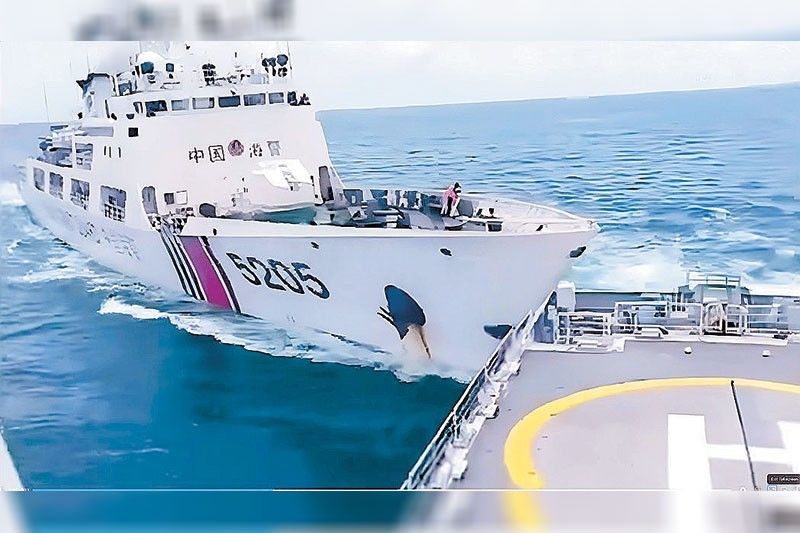Chinese vessel rams PCG patrol ship 3 times

MANILA, Philippines — The Philippine Coast Guard (PCG)’s first 97-meter patrol vessel, BRP Teresa Magbanua, became the latest victim of aggression by Chinese forces, with a single China Coast Guard (CCG) vessel ramming it at least three times.
The patrol ship acquired from Japan lifted anchor in the area within Escoda Shoal at 8:50 a.m. yesterday despite being surrounded by People’s Liberation Army Navy tugboats 185 and 175, CCG vessels 4303 and 3104 and five Chinese maritime militia vessels, according to PCG Commodore Jay Tarriela.
Suddenly, another CCG vessel, 5205, was seen sailing toward BRP Teresa Magbanua, as shown in a photo captured by drone of the PCG.
While the PCG ship was on the move, CCG 5205 performed “dangerous maneuvers” around it.
Tarriela said CCG 5205 hit Teresa Magbanua’s port bow, then turned around and crashed onto its starboard quarter, then turned again and struck its port bow. The collisions left holes in parts of the PCG vessel.
Tarriela said the PCG vessel had to drop anchor again within Escoda Shoal at 2:59 p.m.
He pointed out the CCG carried out its “bullying” moves toward BRP Teresa Magbanua “despite its unprovoked action and presence in Escoda Shoal,” which is near the coast of
Palawan and within the 200-nautical mile exclusive economic zone (EEZ) of the Philippines pursuant to international law and the 2016 Arbitral Ruling.
It previously earned the ire of China, filing a diplomatic protest saying it illegally anchored in Escoda Shoal, while China’s state media suspected that its presence was a sign of the Philippines building a forward deployment base, according to Tarriela.
“For the Philippine Coast Guard, the reason for the deployment of BRP Teresa Magbanua is for us to carry out a legal, legitimate coast guard operation within our exclusive economic zone,” he said,
The operation includes routine patrols and provision of supplies and assistance to both PCG personnel and Filipino fisherfolk in the West Philippine Sea.
Tarriela said PCG Commandant Admiral Ronnie Gil Gavan ordered a team deployed to Escoda Shoal to inspect the damage to BRP Teresa Magbanua.
Tarriela added that no personnel onboard BRP Teresa Magbanua was hurt as a result of the ramming incidents.
The ramming of BRP Teresa Magbanua was the fifth time that the PCG had documented provocations by China near Escoda Shoal, which also targeted both vessels and aircraft from the PCG and the Bureau of Fisheries and Aquatic Resources, in a span of two weeks starting last Aug. 19.
Aside from ramming incidents, the China’s actions included blasting of water cannons by CCG vessels.
Asked about the next action, National Maritime Council spokesman retired vice admiral Alexander Lopez said it would be studied by the Department of Foreign Affairs.
BRP Teresa Magbanua has been in Escoda Shoal since April to prevent suspected reclamation by China, following the discovery by marine science researchers from the University of the Philippines of crushed corals dumped in the area, according to previous reports.
China blames Philippines
Hours after the incident, China was again quick to place the blame on the Philippines, as the former claimed that the PCG’s BRP Teresa Magbanua caused a collision with a CCG vessel in Escoda Shoal.
In a statement issued by the Chinese embassy in Manila, CCG spokesman Liu Dejun said that at 8:02 a.m. yesterday, the BRP Teresa Magbanua, “which was illegally stranded in China’s Xianbin Reef, lifted anchor and continued to maneuver and cause trouble in the Xianbin Reef lagoon.”
“The Chinese Coast Guard ship 5205 took measures such as issuing warnings and following up on ship 9701 in accordance with laws and regulations. At 12:06, the Philippine ship 9701 deliberately collided with the Chinese ship 5205, which was normally enforcing rights and law enforcement, in an unprofessional and dangerous manner, resulting in a collision,” the statement alleged.
Liu asserted that “the responsibility lies entirely with the Philippines.”
“We once again warn the Philippines to face reality, give up illusions and withdraw immediately on its own is the only correct way. Do not misjudge the situation, create hot spots or escalate the situation, otherwise the Philippines will bear all consequences,” Liu said.
Repeating its usual statement despite the 2016 Arbitral Award that rejected China’s expansive maritime claims in the South China Sea and the West Philippine Sea, which numerous nations declare to be legal and binding, China said it “has indisputable sovereignty over the Nansha Islands, including Xianbin Reef, and its adjacent waters.”
“The China Coast Guard will take necessary measures to resolutely thwart all infringements that provoke trouble and cause trouble, and resolutely safeguard national territorial sovereignty and maritime rights and interests,” Liu said.
US slams China
Meanwhile, the United States, through US Ambassador to the Philippines MaryKay Carlson, slammed China for again intentionally ramming a Philippine vessel in the West Philippine Sea.
“The US condemns the multiple dangerous violations of international law by the PRC (People’s Republic of China), including today’s intentional ramming of the BRP Teresa Magbanua while it was conducting lawful operations within the Philippine EEZ,” she said.
“We stand with the Philippines in upholding international law,” Carlson added in a post on X, where she shared Tarriela’s post on the incident.
The US has been consistently calling on China to stop its harassment of Philippine vessels in the West Philippine Sea anchored on the final and binding 2016 Arbitral Award. – With Michael Punongbayan
hile it was conducting lawful operations within the Philippine EEZ,” she said.
“We stand with the Philippines in upholding international law,” Carlson added in a post on X, where she shared Tarriela’s post on the incident.
The US has been consistently calling on China to stop its harassment of Philippine vessels in the West Philippine Sea anchored on the final and binding 2016 Arbitral Award. – Michael Punongbayan
- Latest
- Trending





























